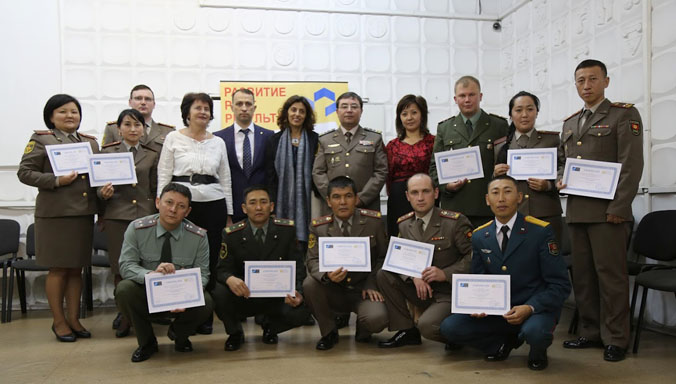Relations with the Kyrgyz Republic
NATO and the Kyrgyz Republic have developed practical cooperation in multiple areas, with the goal of enhancing regional and global security. Key areas of cooperation include security and peacekeeping, defence education reform and building integrity.

Highlights
- Relations with Kyrgyzstan started in 1992, when the country joined the North Atlantic Cooperation Council. This forum for dialogue was succeeded in 1997 by the Euro-Atlantic Partnership Council, which brings together all Allies and partner countries in the Euro-Atlantic area.
- Practical cooperation began when Kyrgyzstan joined the Partnership for Peace (PfP) programme in 1994.
- Objectives for cooperation are set out in the country’s Individual Partnership Cooperation Programme (IPCP), which is jointly agreed every two years.
- The NATO Secretary General’s Special Representative for the Caucasus and Central Asia conducts high-level political dialogue with Kyrgyz authorities.
Key areas of cooperation
Kyrgyzstan’s cooperation with NATO is mutually beneficial and includes:
Building capabilities and interoperability
- Kyrgyzstan participates in numerous PfP activities. The Kyrgyz government has identified a number of units and works towards enhancing their interoperability in view of possible future deployment in a United Nations (UN) peacekeeping operation.
- Under NATO’s Defence Education Enhancement Programme (DEEP), Kyrgyzstan cooperates with NATO experts to reform its military education system and introduce Western approaches and standards, especially in the field of teaching and learning methodologies.
- Since 2015, Kyrgyzstan has participated in the NATO Building Integrity (BI) programme, a capacity-building programme aimed at strengthening integrity, transparency and accountability in defence establishments.
Wider cooperation
- The Kyrgyz Republic has been engaged with the NATO Science for Peace and Security (SPS) Programme since 1993. Leading areas for cooperation have included environmental security, cyber defence and counter-terrorism.
- Kyrgyzstan and NATO work together to increase public understanding of NATO and the benefits of cooperation, including by increasing public access to NATO and security-related documents at the NATO Depository Library at the Diplomatic Academy in Bishkek.
- Kyrgyzstan also participates in a NATO-supported retraining programme for released military personnel. The goal of the programme is to cushion the socio-economic consequences of the country’s restructuring armed forces by facilitating the re-entry of former military personnel into the civilian job market.
